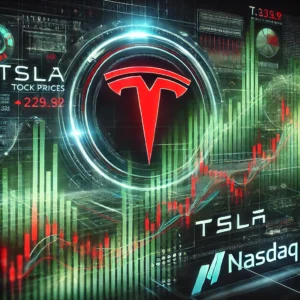Introduction
Tesla, Inc., symbolized by the ticker TSLA, has been one of the most talked-about and polarizing stocks in recent years. From its groundbreaking electric vehicles to its ambitious energy solutions, Tesla has captured the imagination of investors worldwide. TSLA’s stock performance often reflects both its visionary achievements and market volatility, drawing in day traders, long-term investors, and institutions alike. This blog delves into the nuances of TSLA stock, its performance trends, the factors affecting its value, and its potential for future growth.
Tesla’s Rise and the Origins of TSLA Stock
Tesla was founded in 2003, primarily to challenge the auto industry’s traditional norms by focusing on electric vehicle innovation. It wasn’t until 2010, however, that Tesla went public, offering its stock at $17 per share. At the time, many analysts questioned Tesla’s viability. The stock had a slow but steady rise until around 2019, when Tesla’s exponential growth began to reflect in its stock price.
Tesla’s brand recognition, driven by its charismatic CEO Elon Musk, also contributed to its market appeal. The company’s drive to bring sustainable energy solutions to transportation, home energy storage, and solar energy was groundbreaking, drawing significant interest from environmentally focused investors.
TSLA’s Market Volatility
Tesla’s stock is often seen as volatile, fluctuating more dramatically than many other large-cap stocks. This volatility can be attributed to several factors:
1. High Public Interest and Speculation: Tesla’s status as a popular, high-profile company means it’s a frequent target of speculation, both from traditional financial institutions and individual investors.
2. Elon Musk’s Influence: Tesla’s CEO Elon Musk is a unique leader whose actions and public statements have directly affected Tesla’s stock price. From tweets about stock valuations to decisions about Tesla’s Bitcoin holdings, Musk’s behavior sometimes triggers significant price movements.
3. High Short Interest: Tesla has historically been one of the most shorted stocks, attracting skeptics who believe the stock is overvalued. This dynamic has led to short squeezes, which occur when short sellers have to buy back shares to cover losses, further driving up the stock price temporarily.
4. Technological Advancements and Production Challenges: Tesla’s mission to innovate has resulted in massive growth, but it’s also exposed the company to production delays and supply chain issues. These factors influence investor sentiment and stock performance.
5. Competition in the EV Market: Tesla’s dominance in the electric vehicle market is being challenged by traditional automakers and new EV companies. Companies like Ford, GM, and newer brands like Rivian are all competing for market share, impacting TSLA stock as analysts weigh the competitive landscape.
Financial Metrics that Shape TSLA Stock

To understand the behavior of TSLA stock, it’s important to examine Tesla’s key financial metrics. Here are some essential indicators investors look at:
Revenue Growth: Tesla’s revenue growth has been impressive, driven by increased vehicle production, energy product sales, and service growth. Quarterly and annual revenue reports impact stock value, as investors look for consistent growth.
Profit Margins: Tesla’s gross profit margin is an essential metric because it shows how efficiently the company produces and sells its vehicles. Higher profit margins generally lead to a more favorable stock price.
Free Cash Flow (FCF): Positive cash flow is a strong indicator of financial health. For years, Tesla’s FCF was negative due to heavy investments, but it has improved significantly in recent years.
Debt-to-Equity Ratio: Tesla’s debt levels are relatively low, which can be advantageous as it reduces the company’s financial risk. Lower debt means Tesla can more easily navigate economic downturns or unexpected expenses.
Earnings Per Share (EPS): As a measure of profitability, Tesla’s EPS has been on a steady upward trend, improving investor sentiment and supporting a stronger stock valuation.
Factors Influencing TSLA’s Stock Price
TSLA stock’s price is influenced by a unique combination of factors:
1. Global EV Demand: Tesla is leading the electric vehicle revolution, and demand for EVs affects its stock. Global pushes toward reducing carbon emissions have been beneficial for Tesla, positioning it as a leader in sustainable transportation.
2. Production Capacity and Supply Chain Management: Tesla’s ability to meet demand heavily impacts stock performance. Expansion of production facilities, such as Gigafactories, boosts investor confidence, while supply chain disruptions can lead to stock volatility.
3. Innovation in Autonomy and AI: Tesla is also recognized as a frontrunner in autonomous vehicle technology. Advancements in Tesla’s Autopilot and Full-Self Driving (FSD) software could generate additional revenue streams, positively affecting TSLA’s stock.
4. Regulatory Changes: Government incentives and regulations for electric vehicles play a role in Tesla’s business model. Environmental policies in the U.S., Europe, and China (one of Tesla’s largest markets) are critical in determining the company’s financial future and, consequently, TSLA’s stock value.
5. Macroeconomic Factors: Broader economic trends, like interest rates and inflation, influence stock performance. During high inflation periods, for instance, investors may shy away from growth stocks like TSLA, impacting its market price.
Investment Potential: Is TSLA Stock a Buy?
Investing in TSLA stock can be both rewarding and risky. Here are some arguments for and against buying Tesla shares:
Pros:
Growth Potential: Tesla is at the forefront of an industry that’s expected to grow substantially. Analysts predict that the EV market could represent nearly 50% of all vehicles sold by 2030, providing Tesla with growth opportunities.
Diverse Revenue Streams: Beyond vehicles, Tesla’s ventures into solar energy, battery storage, and AI suggest a multi-faceted business model that isn’t solely reliant on auto sales.
Brand Loyalty and Market Position: Tesla has a loyal customer base and brand recognition, making it less susceptible to shifts in customer loyalty.
Cons:
Valuation Concerns: Many analysts argue that TSLA’s stock price is overvalued relative to its financial fundamentals. Tesla’s price-to-earnings (P/E) ratio is often much higher than the industry average, suggesting it could be at risk of a correction.
Competitive Pressure: While Tesla has led the EV market, traditional automakers and new entrants are catching up, which may affect Tesla’s market share over time.
Dependence on Elon Musk: Tesla’s identity and direction are closely tied to Elon Musk, which can be a double-edged sword. Musk’s influence can be beneficial, but if he ever steps down or encounters legal issues, it could negatively impact the stock.
Analyzing TSLA’s Stock Performance: Key Trends
1. Quarterly Earnings Reports: TSLA stock typically reacts strongly to Tesla’s quarterly earnings reports. Investors closely monitor vehicle delivery numbers, production updates, and guidance for the next quarter.
2. Gigafactory Expansion and Production Capacity: Tesla’s global manufacturing expansion into locations like Berlin, Shanghai, and Texas signals growth potential. Increased production capacity means higher revenue possibilities, positively affecting stock valuation.
3. Advancements in Battery Technology: Tesla’s battery technology improvements are crucial for lowering production costs and increasing vehicle range. Battery advancements, such as the 4680 battery cell, could have significant positive effects on TSLA stock.
4. Energy Products and Solar Initiatives: Tesla’s energy products, including solar roofs and battery storage solutions, represent an additional revenue stream. Growth in this area could provide TSLA stock with an added layer of stability.
Tesla’s Future Outlook and the Potential for TSLA Stock
Tesla’s future looks promising as it continues to innovate and expand its global reach. Here’s what the future might hold for Tesla and TSLA stock:
1. Sustained Dominance in EVs: Tesla aims to maintain its leadership in electric vehicles, even as the industry grows more competitive. Product innovation, new vehicle models, and affordable EV options may bolster Tesla’s market share.
2. Fully Autonomous Vehicles: While autonomous driving technology has faced regulatory and technical challenges, it’s a lucrative area. If Tesla can make strides with Full-Self Driving technology, it could unlock significant additional revenue.
3. International Market Growth: Tesla’s focus on expanding in markets like China and Europe underscores its global ambitions. Increased sales in these regions could boost revenue and stabilize stock performance.
4. Energy Storage and Grid Services: Tesla’s Powerwall and Megapack products are already in use by homes and businesses, and their potential to stabilize energy grids offers further revenue opportunities.
Conclusion: Is TSLA Stock Right for Your Portfolio?
Investing in TSLA stock isn’t a decision to take lightly, given the stock’s inherent volatility and Tesla’s ambitious business goals. For growth-focused investors, TSLA presents a compelling opportunity, representing the future of transportation, energy, and sustainability. However, potential investors should consider the risks associated with high valuations, industry competition, and Tesla’s dependence on key figures like Elon Musk.
Ultimately, Tesla’s commitment to innovation and its strong brand position it as one of the most exciting growth stocks available today. Whether you’re considering Tesla for a short-term position or a long-term investment, it’s essential to stay informed about the company’s developments, global trends in the EV market, and Tesla’s financial metrics to make the most informed decision.




